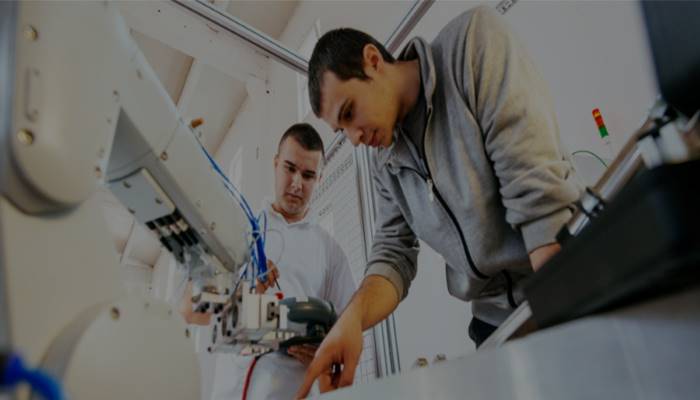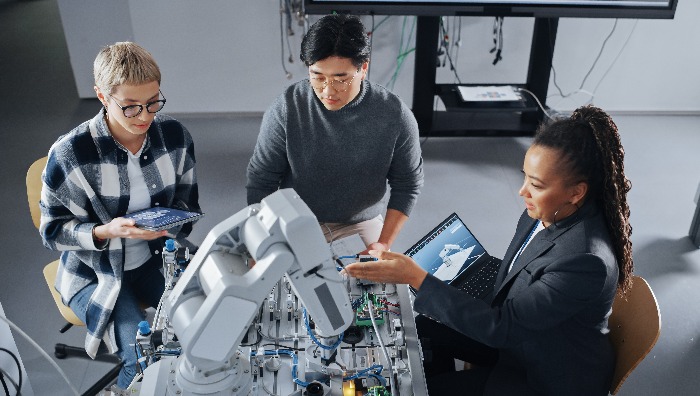News and Events
The robotics industry is constantly changing and evolving. New robotics technologies and developments in automation are quickly creating exciting career opportunities at every education level – from micro-credentials to PhDs. Here is where you can learn more about robotics careers in manufacturing and how these new technologies are benefiting workers


NEWS
Inclusive Innovation: DEIA Principles Guiding Robotics in Manufacturing
May 3, 2024Robotics is transforming how everyday essentials are created. However, this evolution isn't just about machines. It's also about the people working alongside the robots and the ideas and experiences they bring to the table to further develop and innovate this growing field. The principles of DEIA—diversity, equity, inclusion, and accessibility—ensure that the field of robotics welcomes everyone, offering a spectrum of opportunities for all to contribute and thrive.
By embracing DEIA, the robotics sector opens doors for diverse talents and perspectives, enriching the industry with innovative solutions and creative problem-solving. This approach doesn't just make ethical sense; it drives forward innovation, making robotics more adaptable and ready to tackle future challenges.
Diversity in Robotics
Diversity means bringing together individuals from different backgrounds, each with unique perspectives, skills, and life experiences. This variety is the lifeblood of innovation in robotics, enabling the development of technologies that are as diverse as the needs they aim to meet.
The journey into robotics is marked by various entry points, reflecting its commitment to diversity. From high school graduates to those with specialized training, the field offers a place for everyone. This is important as it ensures the field benefits from the broadest possible range of talents and ideas. It's about recognizing that great minds follow different paths or come from different starting lines.
In practice, diversity in robotics means creating teams where every member feels valued and heard. It's about building a community where differences are celebrated as strengths, not seen as barriers. This approach enriches the work environment and creates more thoughtful and practical robotics solutions. By welcoming diversity, the field of robotics sets itself up for a future where technology reflects the rich tapestry of human experience.
Equity in Education and Training
Equity is a cornerstone of a thriving robotics industry, as it ensures that everyone, regardless of their background or financial status, has access to the education and training necessary to pursue a career in robotics. It’s about leveling the playing field so that all aspiring professionals have the opportunity to develop their skills and achieve their potential.
Educational programs and training initiatives play an important role in this endeavor. They offer various pathways for individuals to gain the knowledge and hands-on experience required in robotics. From community colleges offering certificates in mechatronics to online courses designed to teach programming and machine operation, a variety of options are available to suit different learning styles and life circumstances.
Equity also means providing support to those who might need it. Scholarships, mentorship programs, and internships specifically targeted at underrepresented groups in STEM are steps towards this goal. They not only offer financial assistance but also provide valuable experience and networking opportunities, making sure everyone has the chance to succeed.
By focusing on equity, the robotics field is working towards a future of manufacturing built by a workforce as diverse as the society it serves. This commitment to fairness and opportunity is what makes the field not just innovative, but also inclusive and forward-thinking.
Inclusion in the Workplace
Inclusion is about creating a work environment where everyone feels welcome and valued for their contributions. Within robotics, this means fostering a culture where diverse voices are heard and actively encouraged to shape the industry's future.
Companies and organizations are increasingly recognizing the importance of inclusion. They are implementing policies and practices designed to ensure that all employees, regardless of their background, feel a sense of belonging. This includes training programs to reduce unconscious bias, creating more inclusive hiring practices, and establishing employee resource groups to support workers from various communities.
An inclusive workplace is one where individuals can bring their whole selves to work, confident that their unique perspectives will be respected and valued. This approach not only enhances employee satisfaction and retention but also drives innovation. Diverse teams are better equipped to think creatively, solve complex problems, and develop technologies that meet a wide range of needs.
By prioritizing inclusion, the robotics sector is improving the work environment for its current employees and sending a powerful message to potential future workers: robotics is a field where everyone is welcome and has the opportunity to make a difference.
Accessibility in Robotics Careers
Accessibility is key to ensuring that careers in robotics and manufacturing are open to everyone, including those with disabilities. It focuses on removing physical and systemic barriers that might prevent individuals from fully participating in the field, creating opportunities for all to engage with, contribute to, and benefit from advancements in robotics.
In practical terms, accessibility means designing workspaces, tools, and technologies that people with a wide range of abilities use. This could include adaptive equipment for those with physical disabilities or software compatible with assistive technologies used by people with visual or hearing impairments.
Accessibility extends beyond the physical realm. It also encompasses the availability of educational resources and training programs that cater to diverse learning needs and styles. Making sure these programs are accessible means that more people can acquire the skills needed for a career in robotics, regardless of their physical capabilities or educational backgrounds.
Efforts to increase accessibility in robotics are not just about fairness. They're about recognizing the value that a diverse workforce brings to the field. By embracing accessibility, the robotics field can tap into a wider pool of talent, fostering innovation and creativity. This inclusive approach ensures that the advancements in robotics and manufacturing benefit a broader segment of society, making technology a tool for empowerment.
The Impact of DEIA on Innovation
The DEIA principles guide the robotics industry toward a future where technology development benefits from many perspectives and talents.
Teams enriched by diverse backgrounds are known to approach problems with a broader array of solutions, leading to more inventive outcomes. Equity ensures that all these diverse perspectives are heard and utilized, leveling the playing field for all contributors. Inclusion means these varied ideas are not just welcomed but essential for progress. Accessibility ensures that everyone, regardless of physical ability, can contribute to and benefit from advancements in robotics.
By integrating DEIA principles, the robotics industry champions ethical practices and unlocks a higher potential for innovation. This approach ensures that advancements in robotics are reflective of and beneficial to a broad spectrum of society, making the field not only more innovative but also more inclusive.
Challenges and Opportunities
There are challenges to integrating DEIA principles into robotics and manufacturing, including overcoming biases and systemic barriers. These obstacles can limit access for underrepresented groups, restricting the industry's growth and innovation potential.
Yet, these challenges also present opportunities. Efforts to enhance diversity in STEM, implement equitable hiring, and foster inclusive workplaces are gaining momentum. Addressing these issues enriches the talent pool and broadens the range of ideas and solutions in robotics.
Focusing on accessibility leads to more user-friendly technologies, benefiting everyone. This emphasis on inclusivity can spur the development of innovative products that cater to a diverse user base.
Embracing DEIA principles offers a path to a more inclusive and dynamic robotics industry. As these values become more embedded in the sector, they promise to shape a future where technology reflects and serves society's diversity.
Shaping the Future: Robotics and DEIA
Adopting DEIA principles within the robotics and manufacturing sectors propels these fields into leading examples of innovation and inclusivity. By embracing various perspectives and promoting equal opportunities, the industry ignites unmatched creativity. This strategy not only propels robotics technology forward to better serve humanity but also cultivates a future where technology development is both cutting-edge and socially conscious. The commitment to these ideals paves the way for a tomorrow where technological breakthroughs are impactful and truly reflective of global diversity.
In this changing environment, RoboticsCareer.org is an essential tool for those aspiring to shape this promising future. The platform offers personalized job and training recommendations, including programs endorsed by industry leaders, and provides the latest insights into robotics.
Creating a profile on RoboticsCareer.org means setting a path where technology meets talent, redefining what's possible in manufacturing. Your journey into the future of robotics, at the crossroads of innovation and opportunity, starts here.


